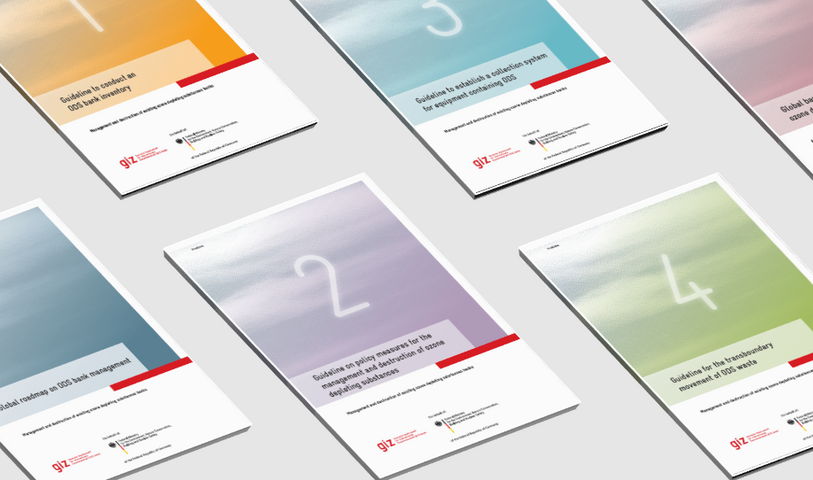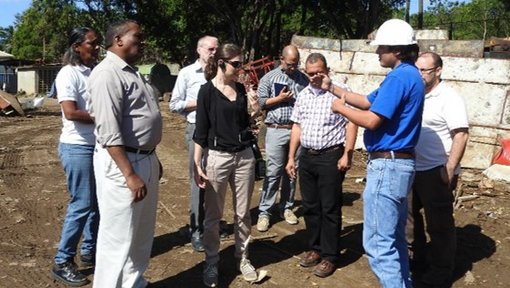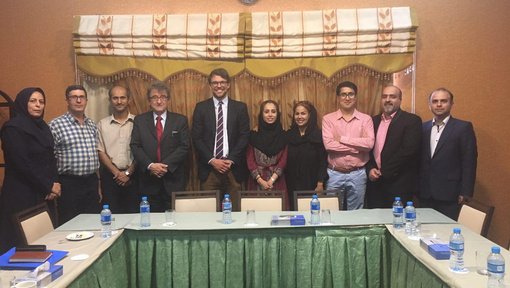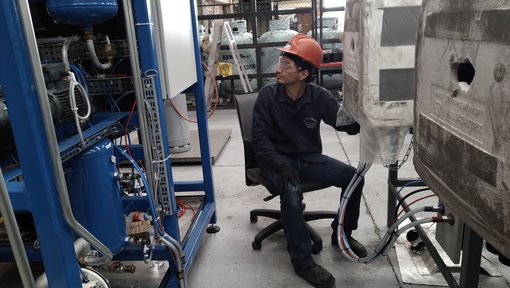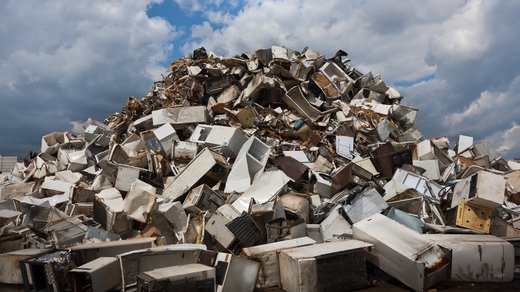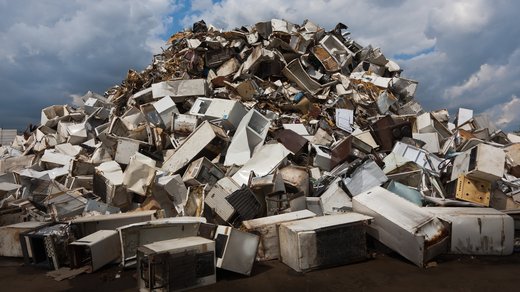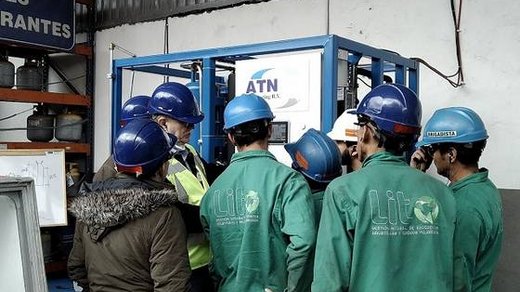By 2030, ozone-depleting substances will be phased out globally. That is a great accomplishment, yet hardly anyone is looking at the chemicals still contained in old appliances. The BMU-financed GIZ project "ODS Bank Management" was one of the first projects worldwide to take on this challenge.
This video is being blocked because of your cookie settings.
While the international community has agreed to regulate the production and consumption of ozone depleting substances by the Montreal Protocol and to phase-down hydrofluorocarbons with its Kigali Amendment, no agreements have been made regarding the destruction of the ODS and HFCs already produced and no financial mechanism is in place. In particular for developing countries, the collection, recycling and destruction of waste containing ODS and HFCs present challenges as they generally lack the appropriate political, regulatory framework, infrastructure and financial resources to set up a national system.
Activities in five partner countries and on a global level
With the project "Management and Destruction of ODS in ODS Banks (opens in a new window)" (overall term: 2013 - 2021), GIZ Proklima has implemented one of the first projects of its kind to address this challenge worldwide. The activities were carried out on behalf of the German Federal Ministry for the Environment, Nature Conservation and Nuclear Safety (opens in a new window) (BMU) in the framework of its International Climate Initiative (opens in a new window) (IKI). The first phase of the project ended in June.
Activities were carried out in a total of five partner countries and at the global level. The project focused on...
- the analysis of the global status quo
- the development of integrated management concepts
- and raising awareness on the urgent need for action to prevent further emissions from the banks.
In contrast to other projects, the project did not have a specific technology focus and tried to provide comprehensive guidelines on the most relevant aspects to set up an ODS banks management system.
Unlocking huge saving potentials
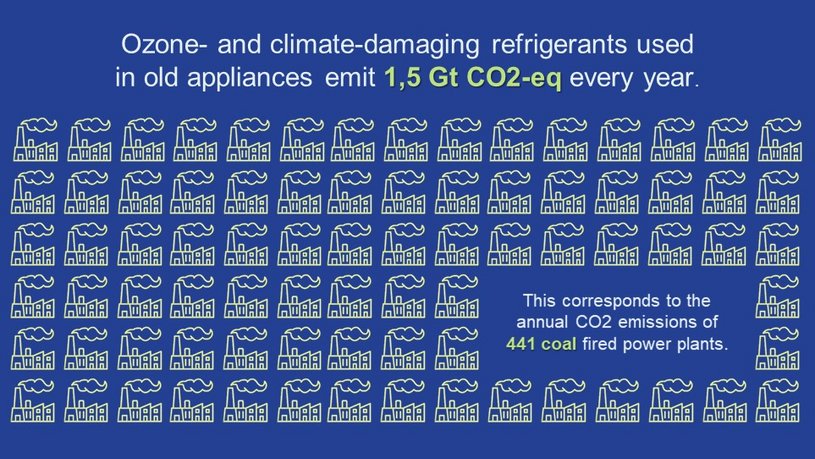
Every year approximately 1.5 Gt CO2-eq are emitted from ODS banks. These are emissions with a cost-efficient mitigation potential that could be prevented to large extent through adequate national and international regulations and implemented actions. The Global Roadmap on ODS Banks Management (opens in a new window) and the detailed Guidelines on key processes give guidance to policy-makers, e.g. national ozone officers and policy-makers from the waste sector, on developing strategies for successful management of ODS banks.
From data to strategies: ODS Banks Management on a national level
In addition to these overreaching guidelines and awareness raising, project activities took place in five partner countries: Colombia, Dominican Republic, Ghana, Iran and Tunisia. As a first step, detailed analyses of current framework, including assessment of legislation, policy instruments and national ODS bank inventories have been carried out. Based on these assessments, national roadmaps for the partner countries have been developed containing recommendations on reliable framework conditions, such as an appropriate set of policy measures, sustainable financial mechanisms, effective collection mechanisms and a functioning ODS recycling and destruction infrastructure. These serve as a basis and strategy document for sustainable ODS banks actions in the countries.
Quote
"The ODS banks roadmap is a very important document that defines actions to address this topic."
Activities
To support the implementation of the measures defined in the roadmap, capacity building activities and stakeholder workshops took place and country-specific initiatives to promote sustainable ODS banks management and destruction activities have been advised. Business models for replacement programs of cooling appliances have been developed in Iran and Tunisia, existing ODS destruction options were analyzed regarding their environmental impact in Ghana and Dominican Republic and in Colombia ODS banks of RAC-subsectors were quantified in detail to subsequently define mitigation actions.
Impressions from our ODS Banks Management partner countries
Results
Partner countries have used the results of the project in various ways: Based on the ODS banks roadmaps, countries like Colombia are developing a detailed ODS banks strategy and activities are being included in the country’s enhanced Nationally Determined Contributions (eNDC). In Tunisia, stakeholders have used ODS bank inventory data to calculate mitigation potential of different actions in the refrigeration and air conditioning (RAC) sector to apply for international funding.
ODS Banks Management: An important topic, yet often overlooked
The project has shown that ODS banks management and destruction is a very important topic with highly relevant mitigation potential. It is a complex issue that requires the active involvement of different stakeholders. Only by addressing all the aspects to ensure that ODS are recovered, collected, stored, transported and destroyed in an environmental sound way, a significant mitigation of ODS and HFC banks emission can be achieved.
In general, these framework conditions are not yet in place and no agreement or regulation on this issue exist at international level. The ODS banks project provides guidelines and templates to allow all countries to initiate actions to reduce emissions from ODS and HFC banks.
Workshop materials: ODS banks inventories and destruction options
In June 2021, two final webinars took place on key elements for successful ODS banks management:
- Quantifying the problem: Estimating national ODS banks and future waste streams
(download presentation) - ODS destruction options for developing countries: Theory and Practice
(download presentation)

